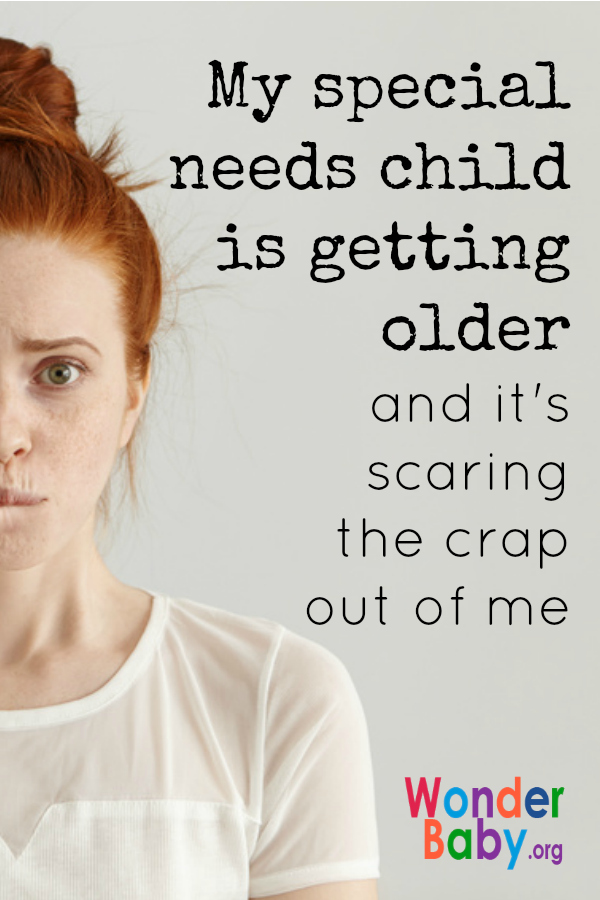My special needs child is getting older and it’s scaring the crap out of me

I didn’t mean to write a blog post today. I have other things I need to do, but this just sort of happened. My son just turned 12 and I’d like to rant for a bit…
When your special needs child starts to age out of typical equipment and toys around kindergarten age (like strollers or swim pants, for example), it’s tough. But then you discover the world of adaptive toys, supplies and equipment for special needs kids. Yeah, they are way more expensive, but at least they fit! But when your special needs child ages out of the special needs kids industry and you’re looking for things that fit a special needs teenager or special needs young adult, suddenly you realize just how little support our society provides to special needs ADULTS.
“Special needs child” is a catch phrase. It’s a search term. It’s a niche market. People blog about raising or teaching special needs kids. There are tons of resources on Pinterest about special needs KIDS.
I don’t know that “special needs adult” or “special needs person” is even a real thing. I think that once you are no longer a child, you’re just disabled. I’m not complaining about the language or lexicon. Honestly, I’ve never been one to get hot and bothered about the words we use or the order in which we use them (I’ve always found the person-first language debate a bit of a bore).
My point is that the words don’t exist because it isn’t an industry. For example, I love Firefly and the products, resources and support community they provide for families raising kids with special needs. But who is doing that same thing for families with adult children with special needs? Do these kids disappear when they turn 22? Maybe they disappear at 18? Actually, it seems like maybe they disappear somewhere around 13, when they are too big for “kid’s” products and too mature for cute little kid blog posts.
I remember reading this blog post written by a mom who was worried about what would happen when her special needs daughter wasn’t cute anymore. She says it better than I can, so here are her words:
When people think you are cute they treat you better. Cute is a shield. And while Julia will always be the cutest thing on the planet to those of us who love her, I am realistic enough to know that as she gets older her looks (like all kids) will change. She will get bigger, she may become awkward, and she will not be viewed as cute by the strangers she encounters. And how will she be treated then? That’s my concern.
Well, I have an answer for her. Don’t worry about it! Your daughter will simply disappear.
I wonder if the idea is that the state is supposed to take over and parents are supposed to move on (by the time your child isn’t a child anymore you’re pretty over the hill I guess), so there isn’t really anyone to market to, so why bother? Are we supposed to believe that once your disabled child graduates to a disabled adult you no longer need support, resources, clothes, equipment, adaptive products designed for them? I don’t believe that’s true. So where are we supposed to go?
And speaking of the state taking over, I’m not so sure about that. I’ve heard over and over again from education professionals and state administrators that “services plummet after 22” (or some other take on the same phrase). Your child has a RIGHT to educational services. We have laws that establish that right. But once your child is 22? Nope. No laws and no rights to services. One rep from the Department of Developmental Services told me that it’s like moving up a hill. You get more and more services as your child gets older and you feel like you have so much support (for all the parents of kids out there shaking their heads asking “what support???” … I feel your pain!) then suddenly they turn 22 and you’re at the top of a cliff and you fall (imagine her miming this action: her arm rising until she reaches as far up as she can go and then down fast, until her hands are in her lap again). “I’m sorry to have to tell you this, but it’s the truth,” she says.
So I ask again: Where are we supposed to go? I see this looming before me as my son gets bigger and older. I know that commercial support systems won’t be there (no offense Firefly, but what about a GoTo Seat for someone over 8 years old?). And I’ve had a state representative IN MY HOUSE tell me that I shouldn’t expect much there (remember: the cliff).
I don’t have an answer for this. I’m just scared. Anyone with ideas or even just words of comfort, please share in the comments!

Related Posts

Eye Conditions and Syndromes, Visual Impairment
Neuralink Announces Plans to Restore Sight to the Blind with Brain Chip
Elon Musk’s company Neuralink has announced plans to begin human trials of its new “Blindsight” brain chip by the end of 2025.

Special Needs
5 Spring Cleaning Tips for Families of Children with Disabilities
Spring cleaning is an opportunity to create a more accessible, organized, and supportive space for your child with disabilities. Declutter, deep clean, and refresh!

Visual Impairment
The Gift of Understanding: How a Young Child Helps His Blind Father Navigate Life
When a parent is blind, it’s natural for people to wonder how their sighted child will adapt. Will they struggle to understand their parent’s needs? Will they feel burdened by...